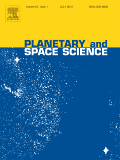
PLANETARY AND SPACE SCIENCE
metrics 2024
Charting New Frontiers: The Intersection of Space and Planetary Science
Introduction
PLANETARY AND SPACE SCIENCE is a leading journal dedicated to the interdisciplinary field of astral studies, encompassing both planetary science and the exploration of space. Published by PERGAMON-ELSEVIER SCIENCE LTD in the United Kingdom, this journal has been pivotal since its inception in 1959, continually contributing to advancements in research about planetary bodies, their atmospheres, and the broader cosmic landscape. With an impressive impact factor, PLANETARY AND SPACE SCIENCE ranks in the second quartile of Astronomy and Astrophysics and the third quartile in Space and Planetary Science as of 2023, showcasing its scholarly significance. The journal aims to provide a platform for the dissemination of cutting-edge research, emphasizing the critical role of space exploration and planetary studies in understanding our universe. Researchers, professionals, and students alike are encouraged to explore the wealth of knowledge presented in its pages, fostering a deeper comprehension of the phenomena that shapes both our solar system and beyond.
Metrics 2024
 0.61
0.61 1.80
1.80 2.10
2.10 104
104Metrics History
Rank 2024
Scopus
IF (Web Of Science)
JCI (Web Of Science)
Quartile History
Similar Journals

NPJ Microgravity
Bridging Science and Society through Microgravity InsightsNPJ Microgravity, published by NATURE PORTFOLIO, is a premier open-access journal dedicated to advancing research in microgravity environments, complementing extensive studies in fields as diverse as Agricultural and Biological Sciences, Biochemistry, Materials Science, Medicine, Physics, and Space and Planetary Science. Since its inception in 2015, the journal has rapidly established itself as an influential platform for disseminating cutting-edge research, evidenced by its Q1 quartile rankings across multiple disciplines and impressive Scopus rankings, including a top 10 placement in Physics and Astronomy. Based in the United Kingdom with an address of HEIDELBERGER PLATZ 3, BERLIN 14197, GERMANY, NPJ Microgravity not only champions innovative studies but also promotes collaborations that can translate scientific knowledge into tangible benefits for society. As an open-access journal, it offers unparalleled accessibility to high-quality research, making it an essential resource for researchers, professionals, and students with a keen interest in the applications and implications of microgravity research.

Chinese Space Science and Technology
Transforming Ideas into Space SolutionsChinese Space Science and Technology is a pivotal journal dedicated to advancing the field of space engineering and technology, published by the esteemed Chinese Academy of Space Technology. With an ISSN of 1000-758X, this publication serves as a significant platform for cutting-edge research from China and around the globe, spanning vital intersections of Aerospace Engineering, Electrical and Electronic Engineering, and Materials Science. As evidenced by its Q3 ranking in 2023 across these categories, the journal consistently showcases innovative studies that contribute to the development of space technology, thereby impacting both theoretical frameworks and practical applications in the industry. Researchers and professionals will find valuable insights within its pages, while students can enrich their educational journey through its wealth of knowledge. Though primarily published in print, the journal continues to foster collaboration and engagement among the academic community, offering a glimpse into the future of space exploration and technological advancements through its relevant and timely content.
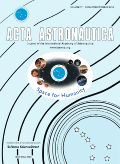
ACTA ASTRONAUTICA
Pioneering Research in Astronautics and BeyondACTA ASTRONAUTICA is a premier journal in the field of aerospace engineering, dedicated to advancing knowledge in space exploration and technology. Published by PERGAMON-ELSEVIER SCIENCE LTD in the United Kingdom, this journal boasts a prestigious Q1 ranking within its category as of 2023, positioning it in the top tier of aerospace engineering publications. With an ISSN of 0094-5765 and an E-ISSN of 1879-2030, ACTA ASTRONAUTICA has been a crucial resource for researchers and professionals since its inception in 1974, continuing to publish cutting-edge research through to 2024. The journal focuses on a wide range of topics, from orbital mechanics and spacecraft design to astronautics and planetary science, aiming to inspire innovation and facilitate the exchange of ideas among scholars, industry experts, and students. ACTA ASTRONAUTICA is ranked 19th out of 153 in its field, highlighting its importance and influence within the aerospace community. Researchers seeking a reputable platform to share their findings will find this journal to be an essential part of the academic discourse in aerospace engineering.
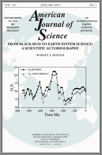
AMERICAN JOURNAL OF SCIENCE
Shaping the Future of Planetary ResearchThe American Journal of Science, published by the esteemed Amer Journal Science, stands as a leading platform for groundbreaking research in the field of Earth and Planetary Sciences. With an impressive impact factor and distinguished Scopus rank 34/195 in its category, the journal occupies a prestigious position in the academic community, reflecting its high-quality and influential contributions to scientific knowledge. The journal’s objective is to disseminate original research, comprehensive reviews, and critical discussions that advance our understanding of geological processes and planetary phenomena, supporting scholars and practitioners in their pursuit of knowledge. Despite its traditional publication structure, viewers can explore its rich repository of works dating from 1945 to present, offering a wealth of insights into the dynamic Earth sciences. The journal remains a vital resource for researchers, professionals, and students eager to engage with the latest scientific findings and foster further innovation in the field.

SPACE SCIENCE REVIEWS
Bridging Disciplines in the Quest for Cosmic UnderstandingSPACE SCIENCE REVIEWS, published by Springer, is a premier interdisciplinary journal that has been at the forefront of space science research since its inception in 1962. With an impressive impact factor and a distinguished Q1 ranking in both Astronomy and Astrophysics, as well as Space and Planetary Science, it stands as a leading platform for the dissemination of cutting-edge research. The journal encompasses comprehensive reviews covering a diverse array of topics, from cosmic phenomena to planetary exploration, serving as a critical resource for researchers, professionals, and students alike. Although it operates primarily under a subscription model, its commitment to excellence and rigorous peer-review process ensures that each article meets the highest standards of scientific integrity. With its headquarters in the Netherlands, SPACE SCIENCE REVIEWS is positioned strategically to foster global collaboration in the field, making it an invaluable asset for anyone interested in the ever-evolving landscape of space science.
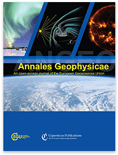
ANNALES GEOPHYSICAE
Advancing Geophysical Knowledge for a Global AudienceANNALES GEOPHYSICAE is a distinguished open access journal published by COPERNICUS GESELLSCHAFT MBH, renowned for its contributions to the field of geophysics and related disciplines. Since its inception in 1996 as an open access journal, ANNALES GEOPHYSICAE has provided a vital platform for researchers to disseminate their findings covering a wide array of topics within Astronomy and Astrophysics, Atmospheric Science, and Earth and Planetary Sciences. The journal enjoys a commendable reputation, evidenced by its impressive 2023 category quartiles, ranking Q1 in Earth and Planetary Sciences (miscellaneous) and Q2 in several other relevant categories, reflecting its significance in the global research community. Based in Germany and accessible to a diverse audience, ANNALES GEOPHYSICAE serves as an essential resource for academics, practitioners, and students alike, striving to foster advancements in our understanding of geophysical phenomena and encouraging collaboration across disciplines.

SOLAR SYSTEM RESEARCH
Exploring the Depths of Our Cosmic NeighborhoodSOLAR SYSTEM RESEARCH, published by Pleides Publishing Inc, offers a comprehensive platform for the exploration and dissemination of scientific knowledge in the fields of Astronomy, Astrophysics, and Space and Planetary Science. With its origins tracing back to 1969, this journal provides a vital resource for researchers and professionals seeking to deepen their understanding of the solar system's complexities, including planetary formation, extraterrestrial geology, and the dynamics of celestial bodies. Although categorized in the Q4 quartile for both relevant disciplines, SOLAR SYSTEM RESEARCH remains committed to publishing high-quality research that contributes to advancing contemporary scientific discourse. Dedicated to fostering collaboration and innovation, the journal is indexed in Scopus and adheres to rigorous academic standards, making it an essential resource for students and professionals alike pursuing the latest developments in solar system studies.

COSMIC RESEARCH
Advancing Knowledge in Aerospace and AstronomyCOSMIC RESEARCH is a prestigious academic journal dedicated to advancing the field of space science, particularly within the domains of aerospace engineering, astronomy, and planetary science. Published by MAIK NAUKA/INTERPERIODICA/SPRINGER, this journal has been a significant contributor to the scholarly discourse since its inception in 1968, with converged years showing robust publication activity until 2024. With a Q4 category ranking in various disciplines, including aerospace engineering, astronomy, and space science, the journal serves as a platform for disseminating innovative research and comprehensive reviews. Although not currently offering open access, COSMIC RESEARCH is renowned for its rigorous peer-review process, ensuring that only high-quality research is shared with the academic community. The journal's ISSN is 0010-9525 and its E-ISSN is 1608-3075. Researchers, professionals, and students alike can benefit from the insights and findings presented in this journal, making it an essential resource for anyone involved in the exploration of cosmic phenomena.

Space: Science & Technology
Transforming Ideas into Aerospace RealitiesSpace: Science & Technology is a premier, open-access journal published by the American Association for the Advancement of Science, dedicated to advancing knowledge in the rapidly evolving fields of aerospace engineering and space sciences. Since its inception in 2021, the journal has rapidly established itself as a vital resource, achieving an impressive Q1 ranking in Aerospace Engineering and Q2 ranking in Space and Planetary Science as of 2023. With a Scopus rank placing it 45th out of 153 in Aerospace Engineering and 47th out of 104 in Space and Planetary Science, it serves as a critical platform for researchers, engineers, and students alike to disseminate their findings and engage with the latest developments in their field. The journal encourages innovative research articles, technical notes, and reviews that push the boundaries of what's possible in space exploration and technology. With its commitment to open access since 2021, Space: Science & Technology ensures that pioneering research is readily available to a global audience, promoting collaboration and knowledge sharing in an increasingly interconnected scientific community.
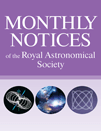
MONTHLY NOTICES OF THE ROYAL ASTRONOMICAL SOCIETY
Exploring the Cosmos, One Discovery at a Time.The MONTHLY NOTICES OF THE ROYAL ASTRONOMICAL SOCIETY (MNRAS), published by Oxford University Press, serves as a premier platform for the dissemination of significant research in the fields of Astronomy, Astrophysics, and Space and Planetary Science. Established in 1913 and with an impressive impact factor reflected in its 2023 Q1 rankings—13th in Earth and Planetary Sciences and 14th in Physics and Astronomy—this journal is renowned for its rigorous peer-reviewed articles, fostering advancements in our understanding of the universe. Researchers, professionals, and students alike benefit from its rich content, which spans a vast array of topics within its scope, from stellar dynamics to planetary formation. While the journal does not currently offer Open Access options, the scholarly contributions published herein are invaluable for pushing the boundaries of contemporary scientific inquiry and ensuring that the latest findings reach an engaged audience globally.